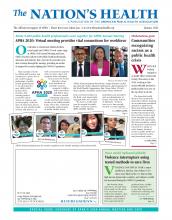
Photo by Jason Armond, courtesy The Los Angeles Times/Getty Images
In May 2018, the Wisconsin Public Health Association adopted this resolution declaring racism a public health crisis, inspiring cities and counties in the state — and eventually Wisconsin’s governor — to do the same. The movement has picked up steam across the U.S., with about 150 jurisidictions also declaring racism a public crisis. For a list of communities and states that have adopted declarations, visit www.apha.org/racism-declarations.
WHEREAS, race is a social construction with no biologic basis; and
WHEREAS, racism is a social system with multiple dimensions: individual racism is internalized or interpersonal; and systemic racism is institutional or structural, and is a system of structuring opportunity and assigning value based on the social interpretation of how one looks, that unfairly disadvantages some individuals and communities, unfairly advantages other individuals and communities, and saps the strength of the whole society through the waste of human resources; and
WHEREAS, racism causes persistent racial discrimination in housing, education, employment and criminal justice; and an emerging body of research demonstrates that racism is a social determinant of health; and
“Racism causes persistent racial discrimination in housing, education, employment and criminal justice; and an emerging body of research demonstrates that racism is a social determinant of health.”
WHEREAS, more than 100 studies have linked racism to worse health outcomes; and
WHEREAS, in Wisconsin, the highest excess death rates exist for African American and Native Americans, at every stage in the life course and our infant mortality rate for infants of non- Hispanic black women is the highest in the nation; and
WHEREAS, the American Public Health Association launched a National Campaign Against Racism; and
WHEREAS, Healthiest Wisconsin 2020 states that, “Wisconsin must address persistent disparities in health outcomes, and the social, economic, educational and environmental inequities that contribute to them;” and
WHEREAS, the Wisconsin Public Health Association has adopted in 2010 the resolution “Achieving Health Equity” and in 2014 the resolution “Promoting a Health in all Policies Framework to Guide Policymaking” and in 2017 convened a Racial Equity Workgroup; and
WHEREAS, public health’s responsibilities to address racism include reshaping our discourse and agenda so that we all actively engage in racial justice work; and
WHEREAS, while there is no epidemiologic definition of “crisis,” the health impact of racism clearly rises to the definition proposed by Galea: “The problem must affect large numbers of people, it must threaten health over the long-term, and it must require the adoption of large-scale solutions.”
THEREFORE, BE IT RESOLVED that the Wisconsin Public Health Association:
♦ Asserts that racism is a public health crisis affecting our entire society.
♦ Conducts an assessment of internal policy and procedures to ensure racial equity is a core element of WPHA, led by the board in collaboration with the Racial Equity Workgroup and other relevant parties, communicates results of assessment, and determines appropriate interval for reassessment.
♦ Works to create an equity and justice oriented organization, with the board and committees identifying specific activities to increase diversity and to incorporate antiracism principles across WPHA membership, leadership, staffing and contracting.
♦ Incorporates into the organizational work plan educational efforts to address and dismantle racism, expand members’ understanding racism, and how racism affects individual and population health and provide tools to assist members to engage actively and authentically with communities of color.
♦ Advocates for relevant policies that improve health in communities of color, and supports local, state and federal initiatives that advance social justice, while also encouraging individual member advocacy to dismantle systemic racism.
♦ Works to build alliances and partnerships with other organizations that are confronting racism and encourages other local, state and national entities to recognize racism as a public health crisis.
On May 27 in Los Angeles, Harina Yacob stands with others to protest the police killing of Minneapolis resident George Floyd.
- Copyright The Nation’s Health, American Public Health Association









